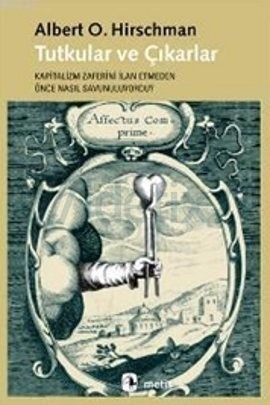What do you think?
Rate this book


152 pages, Paperback
First published January 1, 1977
[Edit: The long-ago promised, much-procrastinated-upon "digested read" is finally done, and can be read on my site! ]
"In a sense, the triumph of capitalism, like that of many modern tyrants, owes much to the widespread refusal to take it seriously or to believe it capable of great design or achievement."
- Albert O. Hirschman, The Passions and the Interests (59)
"In dealing here with the history of ideas I do not aspire to [be] iconoclastic; but, [to] present some evidence that the new arose out of the old to a greater extent than has generally been appreciated. To portray a lengthy ideological change or transition as an endogenous process is of course more complex than to depict it as the rise of an independently conceived, insurgent ideology concurrent with the decline of a hitherto dominant ethic. A portrayal of this sort involves the identification of a sequence of concatenated ideas and propositions whose final outcome is necessarily hidden from the proponents of the individual links, at least in the early stages of the process; for they would have shuddered - and revised their thinking - had they realized where their ideas would ultimately lead." (4-5)
"Out of ferocity, avarice, and ambition, the three vices which lead all mankind astray, [society] makes national defence, commerce, and politics, and thereby causes the strength, the wealth, and the wisdom of the republics; out of these three great vices which would certainly destroy man on earth, society thus causes the civil happiness to emerge. This principle proves the existence of divine providence: through its intelligent laws the passions of men who are entirely occupied by the pursuit of their private utility are transformed into a civil order which permits men to live in human society."
- Giambattista Vico, Scienza nuova
"Once passion was deemed destructive and reason ineffectual, the view that human action could be exhaustively described by attribution to either one or the other meant an exceedingly sombre outlook for humanity. A message of hope was therefore conveyed by the wedging of interest in between the two traditional categories of human motivation. Interest was seen to partake in effect of the better nature of each, as the passion of self-love upgraded and contained by reason, and as reason given direction and force by that passion. The resulting hybrid form of human action was considered exempt from both the destructiveness of passion and the ineffectuality of reason. No wonder that the doctrine of interest was received at the time as a veritable message of salvation!" (44-45)
"This is not just a matter of the original actors keeping their self-respect, but is essential if the succeeding power holders are to be assured of the legitimacy of the new order: what social order could long survive the dual awareness that it was adopted with the firm expectation that it would solve certain problems, and that it clearly and abysmally fails to do so?" (131)
In one of the most attractive and influential of these critiques, the stress is on the repressive and alienating feature of capitalism, on the way it inhibits the development of the “full human personality.” From the vantage point of the present essay, this accusation seems a bit unfair, for capitalism was precisely expected and supposed to repress certain human drives and proclivities and to fashion a less multifaceted, less unpredictable, and more “one-dimensional” human personality. This position, which seems so strange today, arose from extreme anguish over the clear and present dangers of a certain historical period, from concern over the destructive forces unleashed by the human passions with the only exception, so it seemed at the time, of “innocuous” avarice. In sum, capitalism was supposed to accomplish exactly what was soon to be denounced as its worst feature.